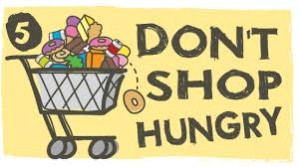Anecdotally, I know it’s a bad idea to go shopping for groceries when I’m hungry.
I buy all kinds of crap.
According to Anahad O’Connor writing in The New York Times, the weight loss maxims found in diet books do not always hold up in the real world. So two  researchers at Cornell University recently devised an experiment that put this notion to the test.
researchers at Cornell University recently devised an experiment that put this notion to the test.
The study, published in JAMA Internal Medicine, was carried out in two phases. In the first, 68 men and women were brought into a lab on two separate days after having been told not to eat for five hours. Then they were allowed to “shop” (stop writing with dick fingers) for food in a simulated grocery store, which offered low-calorie options like fruits, vegetables and chicken breasts, as well as higher-calorie junk foods.
Before shopping, half of the subjects were given a snack. Both groups ultimately purchased a similar number of items, but those who shopped while hungry picked the highest-calorie foods.
In the second phase of the study, the researchers followed 82 actual shoppers in a grocery store. Once again, they found that people shopping at times when they were most likely to be hungry opted for the foods that were more calorically dense.
The bottom line:
Shopping for groceries on an empty stomach does in fact influence food choices.


